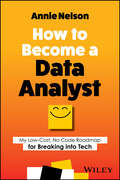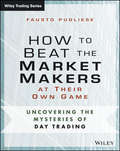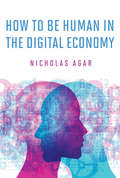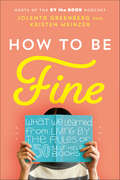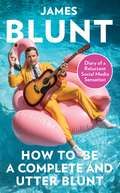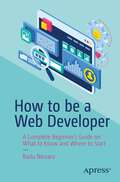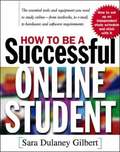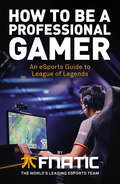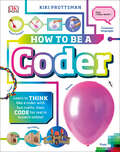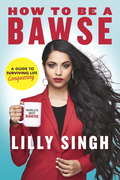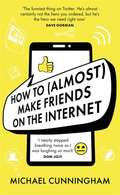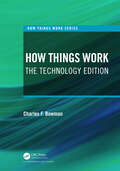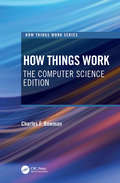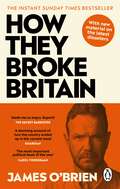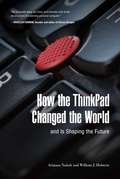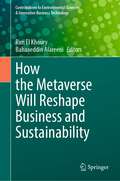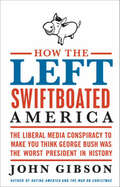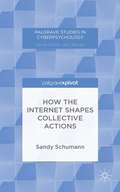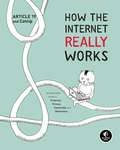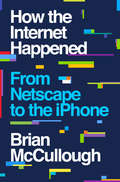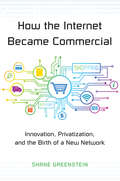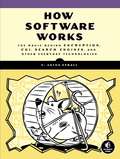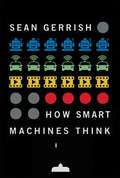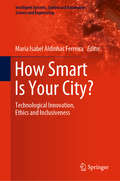- Table View
- List View
How to Become a Data Analyst: My Low-Cost, No Code Roadmap for Breaking into Tech
by Annie NelsonStart a brand-new career in data analytics with no-nonsense advice from a self-taught data analytics consultant In How to Become a Data Analyst: My Low-Cost, No Code Roadmap for Breaking into Tech, data analyst and analytics consultant Annie Nelson walks you through how she took the reins and made a dramatic career change to unlock new levels of career fulfilment and enjoyment. In the book, she talks about the adaptability, curiosity, and persistence you’ll need to break free from the 9-5 grind and how data analytics—with its wide variety of skills, roles, and options—is the perfect field for people looking to refresh their careers. Annie offers practical and approachable data portfolio-building advice to help you create one that’s manageable for an entry-level professional but will still catch the eye of employers and clients. You’ll also find: Deep dives into the learning journey required to step into a data analytics role Ways to avoid getting lost in the maze of online courses and certifications you can find online—while still obtaining the skills you need to be competitive Explorations of the highs and lows of Annie’s career-change journey and job search—including what was hard, what was easy, what worked well, and what didn’t Strategies for using ChatGPT to help you in your job searchA must-read roadmap to a brand-new and exciting career in data analytics, How to Become a Data Analyst is the hands-on tutorial that shows you exactly how to succeed.
How to Beat the Market Makers at Their Own Game
by Fausto PuglieseThe basic skills for becoming a successful trader from a master of the gameWritten by Fausto Pugliese (founder and CEO of Cyber Trading University) this must-have resource offers a hands-on guide to learning the ins and outs of active trading. How to Beat the Market Makers at Their Own Game gives professionals, as well as those relatively new to investing, a behind-the-scenes look at the inner workings of the marketplace and a comprehensive overview of basic trading techniques. The book explains how to apply the trading strategies of acclaimed trader Fausto Pugliese. Step by step the author covers the most common market maker setups, shows how to identify market maker traps, and most importantly, reveals how to follow the direction of the lead market maker in an individual stock.Throughout the book, Pugliese puts the spotlight on Level II quotes to help investors understand how market makers drive prices and manipulate the market. This handy resource is filled with the tools needed to interpret market maker activity so traders can truly understand the market and trade accordingly.Offers an accessible guide for developing the investing skills to trade with confidenceFilled with the real-world trading experiences and techniques of Fausto PuglieseCovers simple technical patterns that are important in day tradingIncludes a website with exercises to help master the book's techniquesHow to Beat the Market Makers at their Own Game will become your well-thumbed resource for learning what it takes to succeed in short-term stock trading.
How to Be Human in the Digital Economy (The\mit Press Ser.)
by Nicholas AgarAn argument in favor of finding a place for humans (and humanness) in the future digital economy.In the digital economy, accountants, baristas, and cashiers can be automated out of employment; so can surgeons, airline pilots, and cab drivers. Machines will be able to do these jobs more efficiently, accurately, and inexpensively. But, Nicholas Agar warns in this provocative book, these developments could result in a radically disempowered humanity.The digital revolution has brought us new gadgets and new things to do with them. The digital revolution also brings the digital economy, with machines capable of doing humans' jobs. Agar explains that developments in artificial intelligence enable computers to take over not just routine tasks but also the kind of “mind work” that previously relied on human intellect, and that this threatens human agency. The solution, Agar argues, is a hybrid social-digital economy. The key value of the digital economy is efficiency. The key value of the social economy is humanness.A social economy would be centered on connections between human minds. We should reject some digital automation because machines will always be poor substitutes for humans in roles that involve direct contact with other humans. A machine can count out pills and pour out coffee, but we want our nurses and baristas to have minds like ours. In a hybrid social-digital economy, people do the jobs for which feelings matter and machines take on data-intensive work. But humans will have to insist on their relevance in a digital age.
How to Be Fine: What We Learned from Living by the Rules of 50 Self-Help Books
by Jolenta Greenberg Kristen MeinzerA humorous and insightful look into what advice works, what doesn’t, and what it means to transform yourself, by the co-hosts of the popular By the Book podcast.In each episode of their podcast By the Book, Jolenta Greenberg and Kristen Meinzer take a deep dive into a different self-help book, following its specific instructions, rules, and advice to the letter. From diet and productivity to decorating to social interactions, they try it all, record themselves along the way, then share what they’ve learned with their devoted and growing audience of fans who tune in.In How to Be Fine, Jolenta and Kristen synthesize the lessons and insights they’ve learned and share their experiences with everyone. How to Be Fine is a thoughtful look at the books and practices that have worked, real talk on those that didn’t, and a list of philosophies they want to see explored in-depth. The topics they cover include:Getting off your deviceEngaging in positive self-talkDownsizingAdmitting you’re a liarMeditationGoing outsideGetting in touch with your emotionsSeeing a therapistBefore they began their podcast, Jolenta wanted to believe the promises of self-help books, while Kristen was very much the skeptic. They embraced their differences of opinion, hoping they’d be good for laughs and downloads. But in the years since launching the By the Book, they’ve come to realize their show is about much more than humor. In fact, reading and following each book’s advice has actually changed and improved their lives. Thanks to the show, Kristen penned the Amish romance novel she’d always joked about writing, traveled back to her past lives, and she broached some difficult conversations with her husband about their marriage. Jolenta finally memorized her husband’s phone number, began tracking her finances, and fell in love with cutting clutter.Part memoir, part prescriptive handbook, this honest, funny, and heartfelt guide is like a warm soul-baring conversation with your closest and smartest friends.
How To Be A Complete and Utter Blunt: Diary of a Reluctant Social Media Sensation
by James Blunt'Opinions are like arseholes - everybody has one'James Blunt, 6 December 2014Once upon a time, James Blunt's most enduring legacy was a three-minute, thirty-second pop song about a girl he saw on the underground, and a nation's worth of abuse. But with the invention of Twitter, James found his real voice, and with it, the chance to reply with a simple 'up yours'. Now the King of Twitter has ascended to the heady heights of occasionally 'winning the internet'. Selected and introduced by James himself, this is a year in the life of the world's most reluctant social media sensation. Now learn for yourself how to be a complete and utter Blunt . . .
How To Be A Complete and Utter Blunt: Diary of a Reluctant Social Media Sensation
by James Blunt'Opinions are like arseholes - everybody has one'James Blunt, 6 December 2014Once upon a time, James Blunt's most enduring legacy was a three-minute, thirty-second pop song about a girl he saw on the underground, and a nation's worth of abuse. But with the invention of Twitter, James found his real voice, and with it, the chance to reply with a simple 'up yours'. Now the King of Twitter has ascended to the heady heights of occasionally 'winning the internet'. Selected and introduced by James himself, this is a year in the life of the world's most reluctant social media sensation. Now learn for yourself how to be a complete and utter Blunt . . .
How to be a Web Developer: A Complete Beginner's Guide on What to Know and Where to Start
by Radu NicoaraThis complete beginner's guide is for anyone interested in becoming a web developer. Aimed at those without any previous experience, this book provides an overview of the key principles of modern web development.You'll gain insight into the key facets of JavaScript, HTML and CSS, as well as the difference between front-end, back-end, and full stack development. You'll also be introduced to popular tools and frameworks such as React, Angular, GraphQL, and Node.js, and gain an understanding of the role of a web developer: what it entails, how to secure your first role, and how to survive your first week in the job. Moreover, How to be a Web Developer will take you through the steps of building your first web application, allowing you to apply the principles you've learned in a practical way. Filled with additional information and resources, this book will give you the knowledge and tools needed to start your journey to becoming a professional web developer. What You Will LearnMaster the principles of JavaScript, HTML, CSS, and UX DesignUtilize tools and frameworks like React, Angular and GraphQLUnderstand what it means to be a web developer and what it entailsDevelop key soft skills such as teamwork and project managementGain practical knowledge that will help you get started as a web developerWho This Book Is ForComplete beginners without any previous knowledge or experience who are interested in web development.
How to Be a Successful Online Student
by Sara Dulaney GilbertAccording to the National Center for Education Statistics more than 85% of public universities offer non-residential long-distance learning and courses, degrees, or career credentials.
How To Be a Professional Gamer: An eSports Guide to League of Legends
by Fnatic Kikis YellOwStar Spirit Febiven Rekkles Mike DiverIt’s time to become a Legend.Watched by millions and contested by the best professional gamers in the world, League of Legends is more than a game. Since the very beginnning of eSports, Fnatic have been competing at the highest level. In 2011, they won the World Championships and in 2015 they achieved the impossible: an entire regular season undefeated. In How to be a Professional Gamer, they take you inside the elite world of the sport, and into the world of competitive gaming. Sharing their knowledge, expertise, and strategies, it’s only a matter of time before you’re a world champion, too.Including tips on game strategy, teamwork and mental strength, How to be a Professional Gamer is both a guide for how to improve as a regular gamer, and the story of Fnatic and how they’ve conquered the world of eSports.Are you ready?
How to Be a Coder: Learn to Think like a Coder with Fun Activities, then Code in Scratch 3.0 Online (Careers for Kids)
by Kiki ProttsmanLearn to think like a coder without a computer! Each of the fun craft activities included in this book will teach you about a key concept of computer programming and can be done completely offline. Then you can put your skills into practice by trying out the simple programs provided in the online, child-friendly computer language Scratch.This crafty coding book breaks down the principles of coding into bite-sized chunks that will get you thinking like a computer scientist in no time. Learn about loops by making a friendship bracelet, find out about programming by planning a scavenger hunt, and discover how functions work with paper fortune tellers. Children can then use their new knowledge to code for real by following the clear instructions to build programs in Scratch 3.0.Perfect for kids aged 7-9, the various STEAM activities will help teach children the crucial skills of logical thinking that will give them a head-start for when they begin programming on a computer. Famous scientist pages teach children about coding pioneers, such as Alan Turing and Katherine Johnson, and topic pages, such as the Internet, give kids a wider understanding of the subject.Written by computer science expert Kiki Prottsman, How to be a Coder is so much fun kids won't realize they're learning!
How to Be a Bawse: A Guide to Conquering Life
by Lilly SinghFrom the 2017 People’s Choice Award winner for Favorite YouTube Star comes the definitive guide to being a bawse: a person who exudes confidence, hustles relentlessly, and smiles genuinely because he or she has fought through it all and made it out the other side. Lilly Singh isn’t just a superstar. She’s Superwoman—which is also the name of her wildly popular YouTube channel. Funny, smart, and insightful, the actress and comedian covers topics ranging from relationships to career choices to everyday annoyances. It’s no wonder she’s garnered more than a billion views. But Lilly didn’t get to the top by being lucky—she had to work for it. Hard. Now Lilly wants to share the lessons she learned while taking the world by storm, and the tools she used to do it. How to Be a Bawse is the definitive guide to conquering life. Make no mistake, there are no shortcuts to success, personal or professional. World domination requires real effort, dedication, and determination. Just consider Lilly a personal trainer for your life—with fifty rules to get you in the game, including • Let Go of FOMO (Fear of Missing Out): Temptation will try to steer you away from your goals. FOMO is just a test of your priorities, a test that a bawse is ready to pass. • Be Nice to People: Treat niceness like an item on your daily to-do list. People will go out of their way to help and support you because you make them feel good. • Schedule Inspiration: Lack of motivation isn’t permanent or a sign of weakness. Expect it and proactively schedule time to be creative. • Be the Dumbest: Challenge yourself by surrounding yourself with people who know more than you do. It’s a vital way to learn and improve. Told in Lilly’s hilarious, bold voice and packed with photos and candid stories from her journey to the top, How to Be a Bawse will make you love your life and yourself—even more than you love Beyoncé. (Yes, we said it!) WARNING: This book does not include hopeful thoughts, lucky charms, or cute quotes. That’s because success, happiness, and everything else you want in life need to be worked for, not wished for. In Lilly’s world, there are no escalators, only stairs. Get ready to climb.Praise for How to Be a Bawse“Singh segues from her inspirational and uber-watched YouTube videos to essays on how to become a bawse, that is, a supremely self-confident person. She’s been named one of Time’s 2016 ‘30 Most Influential People on the Internet,’ Variety’s ‘10 Comics To Watch for 2016,’ Forbes’s ‘30 Under 30,’ Vogue’s ‘8 YouTube Stars That Are Taking Over the World,’ and more.”—Library Journal “Lilly is a bona fide #girlboss, boss, and bawse. Her meteoric rise has come with so many incredible lessons that we are all lucky to have access to. This book is a must-have for the hustler in all of us.”—Sophia Amoruso, founder and CEO, Girlboss
How to (Almost) Make Friends on the Internet
by Michael Cunningham'Will have you in stitches' The Irish Times'He's almost certainly not the hero you ordered, but he's the hero we need right now' Dave Gorman'I nearly stopped breathing twice as I was laughing so much. Glorious." Dom Joly'Probably the funniest thing I've read this year' Rufus HoundGet ready for the online adventures of one man who just wants to make friendsAnd one very annoyed worldBased on the ingenious Sir Michael Twitter account, How to (Almost) Make Friends on the Internet is the funniest book you'll read this year. Whether it's offering his services as a Karate Lawyer or Funeral DJ, devising the world's worst plan to get a free haircut, or trying to buy a blue bucket that may or may not be for sale, Michael just wants to connect with people.The only problem is that people are slightly less enthusiastic about connecting with him and the results are utterly hilarious.Warning: you'll never think about adding someone called Michael to a group chat the same way ever again.'Finally, someone has worked out a good use for social media and it's brilliantly, painfully funny' Iain Morris, Co-creator of The Inbetweeners'Michael is the funniest human on the internet, bar none. Read his book, you cowards' James Felton, author of 52 Times Britain was a Bellend
How Things Work: The Technology Edition (How Things Work Series)
by Charles F. BowmanIt is beyond trite to say that technology is prevalent in our daily lives. However, many of us remain clueless as to how much of it works. Unfortunately, even for the curious among us, the Web is not always the best vehicle to acquire such knowledge: Information appears in fragments, some of it is incorrect or dated, and much of it serves as jargon-laden discussions intended for professionals. How Things Work: The Technology Edition will serve as a compendium of tutorials. Each section will focus on one technology or concept and provide the reader with a thorough understanding of the subject matter. After finishing the book, readers will understand the inner workings of the technologies they use every day and, more importantly, they will learn how they can make these tools work for them. In addition, the book will also inform readers about the darker side of modern technology: Security and privacy concerns, malware, and threats from the dark web.
How Things Work: The Computer Science Edition (How Things Work Series)
by Charles F. BowmanIt’s axiomatic to state that people fear what they do not understand, and this is especially true when it comes to technology. However, despite their prevalence, computers remain shrouded in mystery, and many users feel apprehensive when interacting with them. Smartphones have only exacerbated the issue. Indeed, most users of these devices leverage only a small fraction of the power they hold in their hands. How Things Work: The Computer Science Edition is a roadmap for readers who want to overcome their technophobia and harness the full power of everyday technology. Beginning with the basics, the book demystifies the mysterious world of computer science, explains its fundamental concepts in simple terms, and answers the questions many users feel too intimidated to ask. By the end of the book, readers will understand how computers and smart devices function and, more important, how they can make these devices work for them. To complete the picture, the book also introduces readers to the darker side of modern technology: security and privacy concerns, identity theft, and threats from the Dark Web.
How They Broke Britain: The Instant Sunday Times Bestseller
by James O'Brien***THE RUNAWAY BESTSELLER, WITH NEW MATERIAL FOR THE PAPERBACK***THE REVEALING, DEFINING ACCOUNT OF THE DARK NETWORK THAT BROKE OUR COUNTRY.Something has gone really wrong in Britain.Our economy has tanked, our freedoms are shrinking, and social divisions are growing. Our politicians seem most interested in their own careers, and much of the media only make things worse. We are living in a country almost unrecognisable from the one that existed a decade ago. But whose fault is it really? Who broke Britain and how did they do it?Bold and incisive as ever, James O'Brien reveals the shady network of influence that has created a broken Britain of strikes, shortages and scandals. He maps the web connecting dark think tanks to Downing Street, the journalists involved in selling it to the public and the media bosses pushing their own agendas. Over ten chapters, each focusing on a particular person complicit in the downfall, James O'Brien reveals how a select few have conspired - sometimes by incompetence, sometimes by design - to bring Britain to its knees.
How the ThinkPad Changed the World—and Is Shaping the Future
by Arimasa Naitoh William HolsteinThe ThinkPad notebook computer has been at the center of the digital revolution that has transformed millions of lives around the world, allowing users to obtain access to their documents, pictures and other personal data from virtually anywhere at any time. More than 100 million ThinkPads have been sold since they were introduced in 1992, some twenty-five years ago. ThinkPads played a prominent role in NASA's space exploration and at the International Space Station. They accompanied explorers who traversed the entire length of the Nile River and conquered Mount Everest. ThinkPads also played a major role in changing the very architecture of how humanity's knowledge is stored and made available.In this book, Arimasa Naitoh, the father of the ThinkPad, collaborates with American business journalist and author William J. Holstein to write candidly about the incredible technological and personal struggles he and fellow engineers faced. And he offers his vision of the future of mobile computing—because this revolution is not even close to being finished.
How the Metaverse Will Reshape Business and Sustainability (Contributions to Environmental Sciences & Innovative Business Technology)
by Rim El Khoury Bahaaeddin AlareeniSustainability is part of every aspect of our life, with climate concerns shaping the future. Thus, it is important to understand how metaverse will affect sustainability, as it is opening both challenges and opportunities for environmental sustainability. On the one side, replacing real-world interactions with 3D virtual and exchanging physical goods with digital ones are significantly less resource-intensive and more carbon-efficient. Therefore, this holds the promise of reducing the environmental pollution. On the other side, metaverse increases e-waste and energy consumption. Given this controversial impact, it is crucial for businesses and researchers to understand how to ensure that the metaverse develops sustainably. This book is popping out several questions: Do businesses understand the metaverse concept and perceive the benefits and advantages of implementing such technologies? How will the metaverse change business? Will metaverse change our working place and skills needed? How can companies get ahead of the change and mold it to their advantage? Will businesses use metaverse? Can metaverse create a more sustainable word? How can we make the metaverse better than what we have now? Is it going to affect environmental sustainability? Will it cause more severe climate problems, or would it be the solution? How can metaverse impact the achievements of SDGs?
How the Left Swiftboated America: The Liberal Media Conspiracy to Make You Think George Bush Was the Worst President in History
by John GibsonIn How the Left Swiftboated America, FOX commentator and bestselling author John Gibson offers the first comprehensive defense of the Bush presidency against its numerous detractors. In this provocative political work, Gibson explores who was right and who was wrong in taking us into the Iraq War and a host of other issues, arguing that it was the Left that actually lied while claiming to expose the truth.
How the Internet Shapes Collective Actions
by Sandy SchumannAfter a Facebook rebellion in Egypt and Twitter protests in Turkey, the internet has been proclaimed as a globe-shifting, revolutionizing force that can incite complex social phenomena such as collective actions. This book critically assesses this claim and highlights how internet use can shape mobilizing processes to foster collective actions.
How the Internet Really Works: An Illustrated Guide to Protocols, Privacy, Censorship, and Governance
by Article 19An accessible, comic book-like, illustrated introduction to how the internet works under the hood, designed to give people a basic understanding of the technical aspects of the Internet that they need in order to advocate for digital rights.The internet has profoundly changed interpersonal communication, but most of us don't really understand how it works. What enables information to travel across the internet? Can we really be anonymous and private online? Who controls the internet, and why is that important? And... what's with all the cats?How the Internet Really Works answers these questions and more. Using clear language and whimsical illustrations, the authors translate highly technical topics into accessible, engaging prose that demystifies the world's most intricately linked computer network. Alongside a feline guide named Catnip, you'll learn about: • The "How-What-Why" of nodes, packets, and internet protocols • Cryptographic techniques to ensure the secrecy and integrity of your data • Censorship, ways to monitor it, and means for circumventing it • Cybernetics, algorithms, and how computers make decisions • Centralization of internet power, its impact on democracy, and how it hurts human rights • Internet governance, and ways to get involvedThis book is also a call to action, laying out a roadmap for using your newfound knowledge to influence the evolution of digitally inclusive, rights-respecting internet laws and policies.Whether you're a citizen concerned about staying safe online, a civil servant seeking to address censorship, an advocate addressing worldwide freedom of expression issues, or simply someone with a cat-like curiosity about network infrastructure, you will be delighted -- and enlightened -- by Catnip's felicitously fun guide to understanding how the internet really works!
How the Internet Happened: From Netscape To The Iphone
by Brian McCulloughTech-guru Brian McCullough delivers a rollicking history of the internet, why it exploded, and how it changed everything. The internet was never intended for you, opines Brian McCullough in this lively narrative of an era that utterly transformed everything we thought we knew about technology. In How the Internet Happened, he chronicles the whole fascinating story for the first time, beginning in a dusty Illinois basement in 1993, when a group of college kids set off a once-in-an-epoch revolution with what would become the first “dotcom.” Depicting the lives of now-famous innovators like Netscape’s Marc Andreessen and Facebook’s Mark Zuckerberg, McCullough also reveals surprising quirks and unknown tales as he tracks both the technology and the culture around the internet’s rise. Cinematic in detail and unprecedented in scope, the result both enlightens and informs as it draws back the curtain on the new rhythm of disruption and innovation the internet fostered, and helps to redefine an era that changed every part of our lives.
How the Internet Became Commercial
by Shane GreensteinIn less than a decade, the Internet went from being a series of loosely connected networks used by universities and the military to the powerful commercial engine it is today. This book describes how many of the key innovations that made this possible came from entrepreneurs and iconoclasts who were outside the mainstream--and how the commercialization of the Internet was by no means a foregone conclusion at its outset.Shane Greenstein traces the evolution of the Internet from government ownership to privatization to the commercial Internet we know today. This is a story of innovation from the edges. Greenstein shows how mainstream service providers that had traditionally been leaders in the old-market economy became threatened by innovations from industry outsiders who saw economic opportunities where others didn't--and how these mainstream firms had no choice but to innovate themselves. New models were tried: some succeeded, some failed. Commercial markets turned innovations into valuable products and services as the Internet evolved in those markets. New business processes had to be created from scratch as a network originally intended for research and military defense had to deal with network interconnectivity, the needs of commercial users, and a host of challenges with implementing innovative new services.How the Internet Became Commercial demonstrates how, without any central authority, a unique and vibrant interplay between government and private industry transformed the Internet.
How Software Works: The Magic Behind Encryption, CGI, Search Engines, and Other Everyday Technologies
by V. Anton SpraulWe use software every day to perform all kinds of magical, powerful tasks. It's the force behind stunning CGI graphics, safe online shopping, and speedy Google searches. Software drives the modern world, but its inner workings remain a mystery to many.How Software Works explains how computers perform common-yet-amazing tasks that we take for granted every day.Inside you'll learn:–How data is encrypted–How passwords are used and protected–How computer graphics are created–How video is compressed for streaming and storage–How data is searched (and found) in huge databases–How programs can work together on the same problem without conflict–How data travels over the InternetHow Software Works breaks down these processes with patient explanations and intuitive diagrams so that anyone can understand—no technical background is required, and you won't be reading through any code. In plain English, you'll examine the intricate logic behind the technologies you constantly use but never understood.If you've ever wondered what really goes on behind your computer screen, How Software Works will give you fascinating look into the software all around you.
How Smart Machines Think (The\mit Press Ser.)
by Sean GerrishEverything you've always wanted to know about self-driving cars, Netflix recommendations, IBM's Watson, and video game-playing computer programs.The future is here: Self-driving cars are on the streets, an algorithm gives you movie and TV recommendations, IBM's Watson triumphed on Jeopardy over puny human brains, computer programs can be trained to play Atari games. But how do all these things work? In this book, Sean Gerrish offers an engaging and accessible overview of the breakthroughs in artificial intelligence and machine learning that have made today's machines so smart.Gerrish outlines some of the key ideas that enable intelligent machines to perceive and interact with the world. He describes the software architecture that allows self-driving cars to stay on the road and to navigate crowded urban environments; the million-dollar Netflix competition for a better recommendation engine (which had an unexpected ending); and how programmers trained computers to perform certain behaviors by offering them treats, as if they were training a dog. He explains how artificial neural networks enable computers to perceive the world—and to play Atari video games better than humans. He explains Watson's famous victory on Jeopardy, and he looks at how computers play games, describing AlphaGo and Deep Blue, which beat reigning world champions at the strategy games of Go and chess. Computers have not yet mastered everything, however; Gerrish outlines the difficulties in creating intelligent agents that can successfully play video games like StarCraft that have evaded solution—at least for now. Gerrish weaves the stories behind these breakthroughs into the narrative, introducing readers to many of the researchers involved, and keeping technical details to a minimum. Science and technology buffs will find this book an essential guide to a future in which machines can outsmart people.
How Smart Is Your City?: Technological Innovation, Ethics and Inclusiveness (Intelligent Systems, Control and Automation: Science and Engineering #98)
by Maria Isabel Aldinhas FerreiraThis book focuses on the potential benefits that the so-called smart technologies have been bringing to the urban reality and to the management and governance of the city, simultaneously highlighting the necessity for its responsible and ethically guided deployment, respecting essential humanistic values. The urban ecosystem has been, in the last decades, the locus to where the most advanced forms of technological innovation converge, creating intelligent management platforms meant to produce models of energy, water consumption, mobility/transportation, waste management and efficient cities. Due to the coincidence of the punctual overlap of its own genesis with the pandemics outbreak, the present book came to embody both the initial dream and desire of an intelligent city place of innovation, development and equity – a dream present in most of the chapters – and the fear not just of the pandemics per se, but of the consequences that this may have for the character of the intelligent city and for the nature of its relationship with its dwellers that, like a mother, it is supposed to nurture, shelter and protect.
